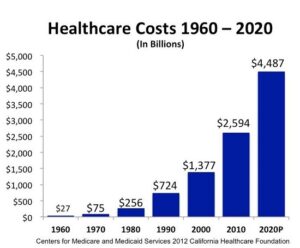This post was written by Mikayla Kirk, an undergraduate student majoring in Gerontology.
What is Medicare?
Medicare is a health insurance program for older adults who are sixty-five years or older, those who are younger but disabled, and those fighting End- Stage Renal Disease.2 According to the Medicare website, these individuals are able to receive hospital insurance, medical insurance, and prescription drug coverage. Considering just how expensive medical bills are, this is a part of government that should be cautious about potential fraudulent acts.
How much are they stealing?
It’s no surprise that Medicare can be very expensive. With fraud put into the mix, even more money that is essentially being stolen is taken out of taxpayers checks. About a decade ago, government caught 990 individuals who participated in fraudulent cases that totaled 2.3 billion dollars in only four years.1 That total alone should inspire some motion that cracks down on Medicare and add a level of security or spread an awareness.
 What is Medicare Fraud?
What is Medicare Fraud?
Con artists who work in health care that unrightfully claim Medicare services and who are receiving money illegally are participating in Medicare fraud. There are many ways that these individuals can go about collecting money. On the AARP website, it is said that these con artists can bill Medicare for certain equipment and medications that they do not have or they can even increase the rate of the items. Identity theft is another way to get money from Medicare by making false claims.3 Medicare recipients may also encounter telemarketers who are selling a product, yet when the product comes it has nothing out of the ordinary in it. They do this so that they get a large payment from Medicare when providing inexpensive items. The website even discusses how someone may even sign up, as well as pay for, Medicare services, but end up not receiving anything. It is alarming how easy it is for these scammers to take advantage of people. The only skills needed to commit Medicare fraud is to understand data entry on computers and know how to recruit people to falsify their information.1
Warning Signs
 Scammers have learned how to get information out of older adults in many different ways. These individuals take advantage of their age to get what they need in order to obtain paid for services from Medicare. Because of how easily these scammers can contact the beneficiaries, AARP has created warning signs so that individuals can be aware whether or not they are being scammed. The warning signs from AARP are:
Scammers have learned how to get information out of older adults in many different ways. These individuals take advantage of their age to get what they need in order to obtain paid for services from Medicare. Because of how easily these scammers can contact the beneficiaries, AARP has created warning signs so that individuals can be aware whether or not they are being scammed. The warning signs from AARP are:
- Any phone call offering free medical supplies or assistance for free just as long as you give them your Medicare number.
- Any clinic or facility that offers free services only for Medicare patients.
- Your doctor says he/she is able to have Medicare pay for a service that is typically not covered.
- Pay attention to you Medicare statements to make sure that everything on that list you did receive.
As we can see, most of these offers seem too good to be true. It is easy to draw people in when they market the scam just right. There needs to be a better awareness for these circumstances and AARP is doing a great job at supporting older individuals. Along with the warning signs, the website provided “do’s” and “don’ts” for when it comes to experiencing fraud:

References
- Suderman, P. (2011). Medicare Thieves. Reason, 43(5), 35–40. Retrieved from https://search-ebscohost-com.proxy.missouristate.edu/login.aspx?direct=true&db=a9h&AN=65471612&site=ehost-live&scope=site
- What’s Medicare? (n.d.). Retrieved from https://www.medicare.gov/what-medicare-covers/your-medicare-coverage-choices/whats-medicare.
- Aarp, & Aarp. (2019, June 17). How Beneficiaries Can Prevent Medicare Fraud. Retrieved from https://www.aarp.org/money/scams-fraud/info-2019/medicare.html.

